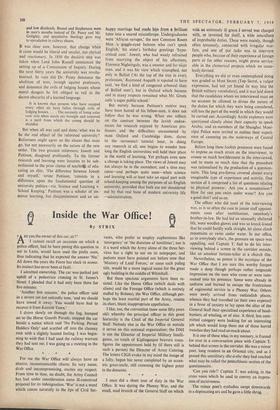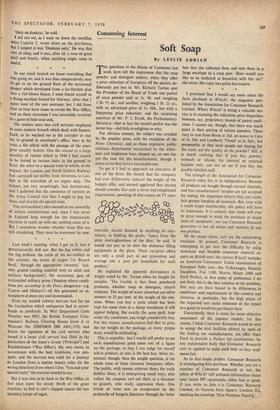Inside the War Office!
By STRIK ARE you the owner of this car, sir?' I cannot recall an occasion on which a police officer, had he been posing this question to me in Latin, would have used the prefix num, thus indicating that he expected the answer 'No.' All down the years the Force has stuck to nonne. Its instinct has never been at fault.
I admitted ownership. The car was parked just uphill of a pedestrian crossing in St. James's Street. I pleaded that it had only been there for five minutes.
'Another five minutes,' the police officer said in a severe yet not unkindly tone, 'and we should have towed it away. You would have had to recover it from Kentish Town.'
I drove slowly on through the fog, bumped on to the Horse Guards Parade, stopped the car beside a notice which said 'No Parking. Permit Holders Only' and scuttled off into the clammy reek with a slightly hunted feeling. I was begin- ning to wish that I had used the railway warrant they had sent me. I was going to a meeting in the War Office.
* * For me the War Office will always have an elusive, incommunicable charm. Its very name, drab and uncompromising, excites my respect. From time to time, no doubt, the Army Council has had under consideration some ill-conceived proposal for its redesignation. War' is not a word which comes naturally to the lips of Civil Ser- vants, who prefer to employ euphemisms like 'emergency' or 'the duration of hostilities'; nor is it a word which the Army alone of the three Ser- vices has a right to use on its notepaper, and pedants must have pointed out before now that 'Ministry of Land Forces,' or some such puling title, would be a more logical name for the great ugly building in the middle of Whitehall.
But these specious arguments have been re- sisted. Like the Home Office (which deals with aliens) and the Foreign Office (which is entirely staffed by Britons), the War Office, although per- haps the least martial part of the Army, retains its short, blunt, inappropriate appellation.
I like, too, the convention (now some fifty years old) whereby the principal officer in this great hierarchy is the Chief of the Imperial General Staff. Nobody else in the War Office or outside it serves on this -notional organisation; the DMI is not the Director of Imperial Military Intelli- gence, no touch of Kiplingesque bravura trans- figures the appointment held by (if there still is such a person)' the Director of Army Catering. The letters CIGS evoke in my mind the image of a folly, begun but never completed by an eccen- tric great-uncle, still crowning the highest point in the demesne.
* * *
I once did a short tour of duty in the War Office. It was during the Phoney War, and the small, mad branch of the General Staff on which with an extremely ill grace I served was charged with, or invented for itself, a wide miscellany of improbable duties. These were mainly, though often tenuously, connected with irregular war- fare, and one of our tasks was to interview people who, because of their experience of foreign parts or for other reasons, might prove service- able in the chimerical projects which we cease- lessly devised.
Everything we did or even contemplated doing was graded as Most Secret (Top Secret, a vulgar expression, had not yet found its way into the British military vocabulary), and it was laid down that the candidates whom we interviewed must on no account be allowed to divine the nature of the duties for which they were being considered, still less the part of the world in which they would be carried out. Accordingly Arctic explorers were questioned closely about their capacity to speak Arabic, and ex-members of the Shanghai Muni- cipal Police were invited to outline their experi- ence of canoeing on the waterways of Central Europe.
Before long these foolish pretences were found to impose so much strain on the interviewer, to arouse so much bewilderment in the interviewed, and to waste so much time that the procedure was rationalised by the production of a question- naire. This long pro-forma covered almost every imaginable type of experience and activity. One section of it comprised a list of questions relating to physical prowess : Are you a mountaineer? How far can you swim under water? Are you a good shot? and so on.
The officer who did most of the interviewing was, as is so often the case in junior staff appoint- ments soon after mobilisation, somebody's brother-in-law. He had led an unusually sheltered life, wore woollen gloves and was so knock-kneed that he could hardly walk straight, let alone climb mountains or swim under water. In our office, as in everybody else's, the pressure on space was appalling, and Captain T. had to do his inter- viewing behind a screen in 'the corridor outside, like an amateur fortune-teller at a church fete.
Nevertheless, so potent is the mystique of the War Office that I am sure this worthy fusspot made a deep though perhaps rather enigmatic impression on the men who came or were sum- moned into his presence. Some were already in uniform and burned to escape the frustrations of regimental service in a Phoney War. Others were newly arrived from outlandish places, whence they had travelled (at their own expense) in a fever of anxiety to lay upon the altar of the General Staff their specialised experience of head- hunters, of whaling, or of zinc. A third, less com- mitted category were looking for an interesting job which would keep them out of those horrid trenches they had read so much about.
It is one of these who, in my memory, is framed for ever in a conversation piece with Captain T. behind that screen in the corridor. He was a minor poet, long resident in an Oriental city, and as I passed this unmilitary tete-a-tete they had reached what may be called the Pentathlonic section of the questionnaire.
'Can you ride?' Captain T. was asking, in the cross voice which he used to convey an impres- sion of incisiveness.
The minor poet's eyelashes swept downwards in a deprecating arc and he gave a little shrug. 'Only on donkeys,' he said.
I did not see, as I went on down the corridor, What Captain T. wrote down on the pro-forma, but I suspect it was 'Donkeys only.' He was that sort of chap, and it was, after all, a time of great peril and fatuity, when anything might come in useful.
In our small branch we knew everything that was going on, and it was thus comparatively easy to get in on the ground floor of the occasional Project which developed from a far-fetched plan into a full-blown fiasco; I soon found myself in a flying-machine bound for Norway. After that 1 spent most of the war overseas; but I did from time to time have cause to revisit the War Office, and on these occasions I was invariably involved in a game of hide-and-seek.
The seekers were two civil servants employed in some esoteric branch which dealt with finance. Each, as he waylaid me in the corridor or ran me to ground in somebody's office, bore in his arms a file which with the passage of the years grew steadily bulkier. One file related to a large quantity of rations which in 1940 I had caused to be buried in various holes in the ground in Kent, the other to a special train in which, at my request, the London and North Eastern Railway had conveyed me swiftly from Inverness to Lon- don in the execution of an urgent duty. The rations, not very surprisingly, had deteriorated, and I gathered that the consensus of opinion on the Army Council was that I ought to pay for them, and also for the special train.
This extraordinary idea seemed tome unworthy of serious consideration and, since I was never in England long enough for the bureaucratic machine to catch up with me, nothing came of it. But I sometimes wonder whether those files are still circulating. They must be enormous by now.
* * *
Last week's meeting, when I got to it, was a preternaturally dull one. But the fug within and the fog without, the rattle of the tea-trolleys in the corridor, the drone of jargon ('at Branch level,' through the appropriate channels,' suit- ably graded reading material with an adult and military background'), the occasional gem of cyclostyled military prose ('theatres where condi- tions are, according to the Press, dangerous—e.g. Cyprus and Malaya')—all this generated an at- mosphere at once cosy and immemorial.
Even my unused railway warrant had for me the fascination which antiquaries find in arrow- heads or potsherds. Its War Department Code Number was 9093, the British Transport Com- mission's Railway Clearing House knew it as Warrant No. DH076858 (BR 4402/129), and below the signature of the civil servant who issued it a lesser civil servant had filled in the particulars of the issuer's Grade ('Principal') and Establishment ('War Office'). My own name, in accordance with the best traditions, was mis- spelt; and the warrant was valid for a journey to London from a station twenty miles (in the Wrong direction) from where I live. 'You and your special train !' the warrant seemed to say.
But it was nice to be back in the War Office, to feel once more the steady throb of the great machine, to find in one's chipped saucer the two statutory lumps of sugar.



































 Previous page
Previous page